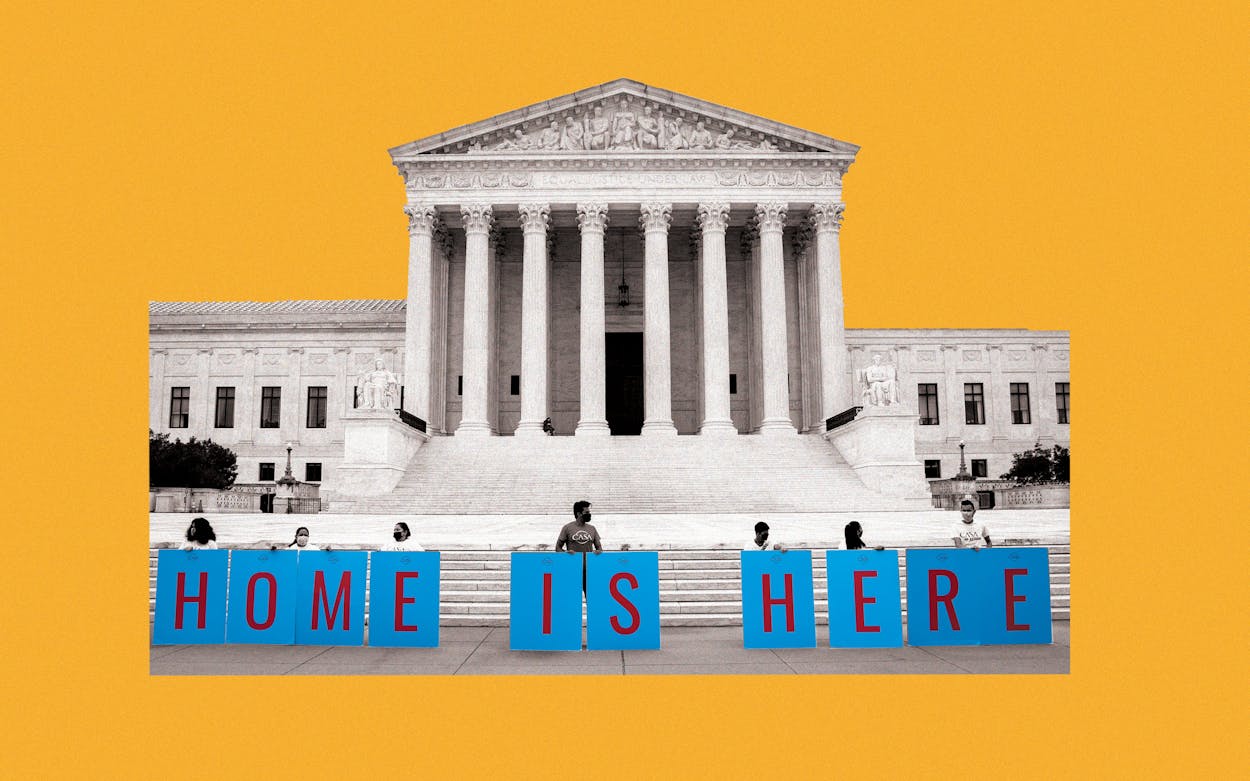Greisa Martinez Rosas grew up in Dallas after emigrating with her parents from Hidalgo, Mexico. She is a recipient of the Deferred Action for Childhood Arrivals [DACA] program and an immigrant rights organizer. Martinez currently serves as the deputy executive director of United We Dream, a national organization of more than 100,000 immigrant youths.
For months, DACA recipients like Martinez had been waiting for the U.S. Supreme Court to rule on the Trump administration’s decision in 2017 to end the program—created by President Barack Obama in 2012—and eliminate protections against deportation for nearly 700,000 individuals. The program allows undocumented individuals who came to the U.S. while under the age of sixteen and who have continuously resided here since June 2007 to work, go to school, and remain in the country on a permit.
The Supreme Court ruled against the Trump administration on procedural grounds, finding its original method of ending DACA to be a violation of federal law. The program remains in place, though the administration still has the power to attempt to end it on other grounds. Martinez described to Cat Cardenas her reaction to the ruling.
I came to the U.S. when I was eight years old. My parents and sisters and I crossed the waters of the Rio Grande holding our hands tight.
We ended up in Dallas, and I grew up in a household with family members of different immigration statuses. There was a lot of pain living in this country as undocumented people of color. I always knew that we had to protect ourselves, that something could happen to us, that someone could be taken away. That fear was felt throughout our home.
I started organizing in high school. I was one of the young students who led the walkouts across the country in 2006, calling for immigration reform. [Rallies that year were organized in response to proposed legislation that would have made one’s first illegal entry a felony and criminalized aiding or employing undocumented immigrants.]
Ten years ago—fifteen years after our family arrived in the U.S.—my father, a Southern Baptist preacher, was deported. We lost our mother to cancer a couple of years ago. She died undocumented. Losing our parents lit a fire inside of me and my siblings.
Today, about forty of us from United We Dream gathered outside of the Supreme Court, waiting for its decision on DACA. The mood was tense. We had been preparing for months and bracing for the worst possible outcome. Some of us were saying little prayers for the decision to come down in our favor. A lot of us had been on the steps every Monday and sometimes Thursdays since the beginning of the year; I had been there about a dozen times waiting for my fate and the fate of my family and friends to be decided, each time grounding myself in the words of poet and activist June Jordan: “We have come too far/We can’t turn ’round/We will flood the streets with justice, because we’re freedom bound.”
When we found out at 9 a.m. Thursday that the Supreme Court had ruled five to four against the Trump administration, the crowd erupted into chanting and singing. It felt like we—myself, everyone outside the court with me, and the hundreds of thousands of DACA recipients in the country—could finally take a deep breath. Our relentless organizing, and ability to fight in moments of uncertainty, had paid off.
I heard people calling out for Black Lives Matter, for queer people, or yelling, “We’re here to stay.” We broke into chants: “People want to know who we are, so we tell them. We are the immigrants, the mighty, mighty immigrants fighting for justice and our families.”
I’m grateful for days like this where we can celebrate, but I’m also committed to having more of them until all of us are free.
No matter what Trump decides to do, no matter what the attorney general says, we will keep fighting. We’re fighting for black and brown people, queer people—this is bigger than just DACA. For so long, we have seen black and brown people treated as subhuman. Particularly in this current moment, where our labor in farms, hospitals, and food-packing plants has been considered essential, but our bodies and our lives are seen as disposable. We are having to fight for our humanity to be understood. Being documented didn’t save George Floyd or Breonna Taylor, so our work and our struggles are ongoing.
We still have the same spirit that got millions of us out in the streets fourteen years ago, so we’re not going anywhere. We still believe in joy. Throughout the uncertainty, throughout the pain, we have found each other and we have created a place where we can be loud. We can be proudly undocumented and unafraid.
I still keep in touch with my dad and he’s so proud of the work that my siblings and I do for our community. We are grounded in the teachings that he and my mother gave us: to serve our community and to walk humbly.
- More About:
- Politics & Policy
- Supreme Court
- Donald Trump








